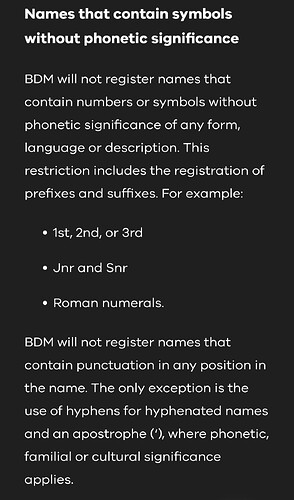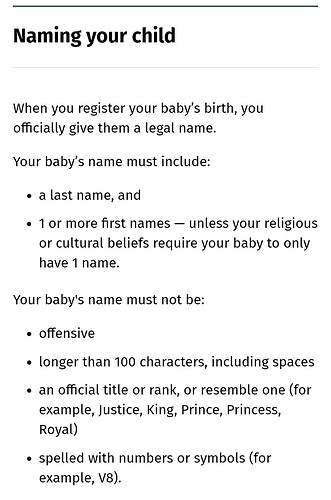So happy you did it!!! 

 I have never made a post, so I felt shy to the max
I have never made a post, so I felt shy to the max  So interesting to read the responses. I would be especially excited, if anyone knows the Norwegian rules
So interesting to read the responses. I would be especially excited, if anyone knows the Norwegian rules 

So basically, I understand that gender neutral names, or using a name for the opposite gender is a no go. Unless you prove it’s a tradition in your country or something. Also only 2 middles  and no made- up names. The name has to be in use. And no dukes and princess’es, and numbers.
and no made- up names. The name has to be in use. And no dukes and princess’es, and numbers.
I just copy the paragraphs of the Estonian Names Act. Then it’s 100% correct:
§ 6. Requirements for surnames
(1) A surname may consist:
-
upon assigning, of one name or two names linked by a hyphen;
-
upon application, of one or several names.
(2) In this Act, the surnames of persons who are or have been married to each other, are related by blood or are or have been related by marriage and the spelling of which coincides letter by letter, and also names the differences in the spelling of which are caused due to the reflection of gender, marital status or other feature in the name pursuant to the national tradition of the persons are deemed to be joint surnames.
(3) Features on the basis of which surnames are considered as joint surnames shall be established by a regulation of the minister in charge of the policy sector.
(4) In the case of doubt with respect to the accuracy of a national or an ethnical name form, an administrative authority or a court assigning or applying the surname shall address the Office of Onomastic Expertise or a diplomatic representation of the corresponding state in order to obtain explanations.
(5) A surname may not contain numbers or non-alphabetical signs or be separately or together with the given name contrary to good morals.
(6) Exceptions to the provisions of subsection 1 of this section may be made if, due to his or her citizenship, family relations, national identity or religion, a person has personal connection to the foreign-language name tradition and the name applied for complies therewith.
(7) The requirements provided for in this section shall not apply to the application of surnames.
§ 7 Requirements for given names
(1) A given name may consist:
- upon assigning, of not more than three names written as several words or two names linked by a hyphen;
- upon application, of one or several names.
(1’1) A non-Estonian given name must be in use in another state as a given name.
(2) A name which contains numbers or non-alphabetical signs or which separately or together with the surname is contrary to good morals shall not be assigned as a given name.
(3) The following shall not be assigned as a given name without good reason:
-
an unconventional given name which is not suitable to be used as a given name due to its complex spelling or pronunciation, or spelling or pronunciation which does not comply with the general language use, or due to its general linguistic meaning;
-
a name which does not correspond to the gender of the person;
-
a well-known name used as a personal name or a shortened version of the name, a name of a well-known author or a service name. For the purposes of this Act, a service name is a name which is used upon performance of official duties, but which is not the official name of the person.
(4) Exceptions to the provisions of subsections 2 and 3 of this section may be made if, due to their citizenship, family relations, national identity or other circumstances, a child or the parents of a child have personal connection to the foreign-language name tradition and the name applied for complies therewith.
Link to the Names Act (refresh it by clicking ‘in force’ in the right. Then you know everything is up to date). It’s actually pretty short and there’s more details.
![]()

